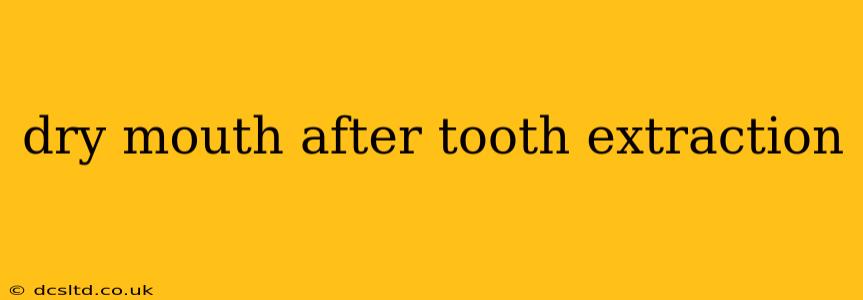Dry mouth, medically known as xerostomia, is a common side effect after tooth extraction. It's characterized by a persistent feeling of dryness and stickiness in the mouth, often accompanied by discomfort and difficulty swallowing. While usually temporary, understanding its causes, prevention strategies, and treatment options can significantly improve your post-extraction recovery.
What Causes Dry Mouth After Tooth Extraction?
Several factors contribute to dry mouth following a tooth extraction:
-
Medication: Many pain medications prescribed after oral surgery, such as opioids, have dry mouth as a known side effect. These medications affect the salivary glands' ability to produce saliva.
-
Mouth Breathing: After surgery, some individuals may breathe through their mouths due to discomfort or swelling. This can lead to increased dryness because the mouth's natural moisture is lost through evaporation.
-
Dehydration: Insufficient fluid intake can exacerbate dry mouth. It's crucial to stay well-hydrated following a tooth extraction to support the healing process and maintain adequate saliva production.
-
Nerve Damage (Rare): In rare cases, damage to the salivary glands or nerves during the extraction procedure might contribute to persistent dry mouth. This is less common and usually resolves over time.
How Can I Prevent Dry Mouth After Tooth Extraction?
Proactive steps can minimize the risk of experiencing significant dry mouth:
-
Hydration is Key: Drink plenty of water throughout the day. Avoid sugary or alcoholic drinks, as they can further dehydrate you. Consider electrolyte drinks if you're sweating excessively.
-
Avoid Smoking and Alcohol: Both smoking and alcohol consumption can worsen dry mouth and hinder the healing process. Refrain from these substances after your extraction.
-
Choose Your Medications Wisely: Discuss potential side effects, including dry mouth, with your dentist or oral surgeon before starting any medication. They may be able to offer alternatives with fewer side effects.
-
Use Sugar-Free Gum or Candy: Stimulating saliva production can help alleviate dry mouth. Sugar-free options are preferred to avoid contributing to infection or further dehydration.
How Long Does Dry Mouth Last After Tooth Extraction?
The duration of dry mouth varies depending on individual factors and the complexity of the extraction. In most cases, it subsides within a few days to a week as the effects of medication wear off and healing progresses. If it persists for an extended period or is severe, consult your dentist or oral surgeon.
What Can I Do to Treat Dry Mouth After Tooth Extraction?
Several methods can alleviate dry mouth symptoms:
-
Saliva Substitutes: Over-the-counter saliva substitutes are available at pharmacies. These are artificial salivas that mimic the natural lubrication of saliva.
-
Humidifier: Using a humidifier, especially at night, can add moisture to the air and help prevent dryness.
-
Rinse Your Mouth Regularly: Gentle rinsing with salt water can help maintain oral hygiene and may provide some relief from dryness. Avoid forceful rinsing near the extraction site.
-
Avoid Mouthwashes with Alcohol: Alcohol-based mouthwashes can further dry out your mouth, so stick to alcohol-free options.
Is Dry Mouth After Tooth Extraction Serious?
While usually not serious, persistent or severe dry mouth warrants a visit to your dentist or oral surgeon. Prolonged dryness can increase the risk of infection and hinder the healing process. They can assess the situation, rule out any underlying complications, and provide appropriate treatment.
When Should I Call My Dentist?
Contact your dentist or oral surgeon immediately if you experience:
- Severe or persistent dry mouth: Lasting more than a week or significantly impacting your comfort.
- Signs of infection: Increased pain, swelling, redness, or pus at the extraction site.
- Difficulty swallowing or breathing: These could indicate more serious complications.
This information is for general knowledge and does not constitute medical advice. Always consult with a qualified healthcare professional for any health concerns or before making any decisions related to your health or treatment.
